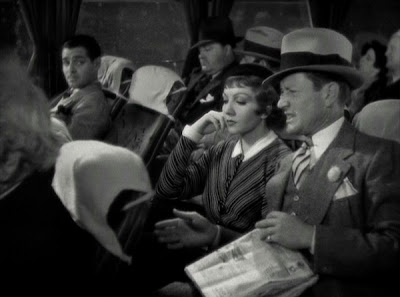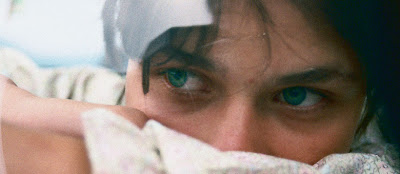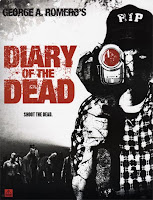Steve reporting from the Toronto International Film Festival[You may have noticed that Day 2 is just a teensy bit late. The reason for all this will become clear when I post my Day 3 writeup tonight.]
One thing that has surprised me about Toronto is the absence of jaywalking. As one accustomed to the rhythms of New York City, it's been quite odd to see people actually, y'know, waiting at a red light. Even when the traffic is clear, the majority of pedestrians will choose to stand on the corner and wait for their turn. Hell, I'm apprehensive about doing it and I do it all the time. Yet I'm afraid that, the moment I step into the crosswalk against a red, a pedestrian traffic SWAT force is going to pull up and, guns drawn and cocked, demand forcefully that I plant my feet back on the corner and wait for the green. Maybe that's the tradeoff for the fact that cars here actually stop and let pedestrians pass before trying to proceed, even the ones making right turns. Patience, it seems, is an important virtue.
Given the nature of much of the international film-festival scene, patience is also helpful when cruising the festival. Friday, for some reason, ended up being a contemplative-cinema kind of day, the kind of day where much of my time was spent admiring the craft and/or acting of the films seen while overlooking the fact that not much is really happening and it's not happening at a languid pace.

This is, of course, not necessarily a bad thing, especially when the man at the helm of the contemplation is Jacques Rivette. Rivette's films are notoriously lengthy and expansive in scope -- his masterwork, 1971's
Out 1, runs a stunning twelve-and-a-half hours -- so something like the 135 minutes of
Ne touchez pas la hache (literally,
Don't Touch the Axe but retitled
The Duchess of Langelais, after the Balzac novel it uses as a source, for the English-language market) is a workman's holiday for him.
Langelais charts the illicit push-pull relationship between Jeanne Balibar, as the titular Duchess, and Guillaume Depardieu, as the fiery General Montriveau, and the fascination lies in watching these two souls, so obviously enamored with one another, waylaid by stubbornness and the mores of the times into destructive, emotionally evasive gamesmanship. Balibar gives a fine performance -- early on, her modest, slightly sly smile is allowed to crack at the corners just enough to show the roiling underneath, and when the narrative shifts to focus on her in the film's second half, she shoulders the burden admirably, exposing us to this woman's heartbreak as she goes from trying to keep up appearances to not giving a damn. Her every move is matched by Depardieu's implosive turn; a steely gaze and careful economy of movement cast off a perfect impression of a strong-willed man who will not be outflanked by the Duchess and wants to have his terms reign. Rivette does right by the tony surfaces and placid rhythms of 17th-century court life, yet this seeming calm makes the brutal emotions beneath the surface that much more explosive. I think
Langelais loses a bit in its second hour (or that could just be the AM screening time talking), but overall it's a worthy addition to a striking body of work.
Taiwanese fest favorite Hou Hsiao-Hsien also has a significant body of work to his credit, of which I am unfortunately ignorant. His
Flight of the Red Balloon is only the second film of his that I've seen (after
Millennium Mambo); on the strength of it, though, I'd be interested in combing through his earlier films.
Balloon is a gentle and lovely piece about a French family, and the story (such as it is) contrasts the quiet everyday routines of young Simon (Simon Iteanu) and his new nanny Song (Fang Song) with the more hectic schedule of Simon's mother Suzanne (Juliet Binoche); meanwhile, the title object drifts in and out of the film as Hou sees fit, never quite interacting with the characters but sort of observing them. The unhurried observational style, heavy on long shots and low on edits, is mated with a loose improvisatory acting style, resulting in a number of moments that feel true in ways that most other films wouldn't think to acknowledge. (The sound design in particular is spectacular -- there's a moment where Binoche, climbing a set of stairs, bangs some keys on the metal railing, and the resulting clang took me aback simply because it's not the kind of thing I normally expect films to focus on.) It's a film that I find growing in my memory, simply because its leisurely pleasures need time to sink in. I'd like a chance to rewatch
Balloon somewhere down the line, though I'm still unsure of how it relates to the famed original French short.
What, then, does one watch for an encore after a Hou film? Being the kind of guy I am, I followed up the contemplative with something even quieter: a film with no sound at all. Peter Hutton's
At Sea formed the major portion of
What the Water Said, the first program of Toronto's annual avant-garde section Wavelengths. On paper,
At Sea doesn't sound like something that would hold the interest all that strongly -- it's an hour divided into three segments depicting the life cycle of a freighter boat, shot mostly in carefully-composed long shots and in absolute silence. In practice, though, it's hypnotic -- the lack of sound gives the footage a hushed, almost foreign grandeur. The first segment, in which we see a boat being built, was the most interesting to me, mainly because the extreme distance between the camera and the boat, necessary to capture the size of the thing, also made the people working on the boat very small. It's a depiction of scope, of people reduced to components in an environment, that I wish I saw more often. At times, Hutton's film comes off as a benevolent cousin to Werner Herzog's scorching
Lessons of Darkness -- both films tell a story using primarily images, both focus on the (accidental?) beauty in the makeup of things and both show man reduced to a function of his surroundings. Pretty stirring stuff, in other words. (There were also two shorts on the same program. David Gatten's
What the Water Said, Nos. 4-6 provides some formal pleasures similar to the work of Stan Brakhage, but the random nature of its construction -- Gatten submerged celluloid in ocean water to see what kind of patterns would emerge -- stymie the emotional force of Brakahge's best works; meanwhile, as a meditation on the aftermath of the tsunami that hit Thailand, Chris Ching Chan Fui's
POOL means well.)

Canadian auteur Guy Maddin also has a jones for silent films, yet his films could be called anything but patient. His latest film
My Winnipeg is ostensibly a documentary portrait of his hometown, yet one glance will tell you that it's just another inspired entry in the ludicrous filmography of Maddin -- its historical worth is suspect, but its entertainment value is endless. Maddin's last couple films have been inexorably moving towards the personal as he refines his frenzied muse, and
My Winnipeg might be his most ecstatically unfiltered slice of madness yet. It also sees him indulging in dialogue, a rarity for Guy. Yet even with words occasionally coming from his characters' mouths, this is still unmistakable Maddin. It's all here -- the smash edits that would fill Dziga Vertov with pride, the ironically humorous interstitals, the Freudian fetishes and Oedipal worship, the odd mix of Canadian pride and deprecation, the talismanic repetitions, the naked male butts. Plus, Maddin himself was on hand to provide the running commentary that functions as both a way to hold the film together and a free-floating dollop of fun all its own. If you get a chance to see
My Winnipeg, do so -- it's a hilarious mix of documentary and personal reflection with a soupcon of insanity for taste. Besides, where else are you going to hear someone rhapsodizing on the electromagnetic properties of bison as one reason Winnipeg natives have trouble leaving the city?
 My updated Oscar predictions for Best Supporting Actress go easy on that particular type. But what if the marriages are of the on-set variety instead. Two of this year's possible nominees (Jennifer Jason Leigh and Helena Bonham-Carter) are partnered with their directors offscreen. How often is a real life Mrs. nominated for her Mr.'s movie?
My updated Oscar predictions for Best Supporting Actress go easy on that particular type. But what if the marriages are of the on-set variety instead. Two of this year's possible nominees (Jennifer Jason Leigh and Helena Bonham-Carter) are partnered with their directors offscreen. How often is a real life Mrs. nominated for her Mr.'s movie?







































